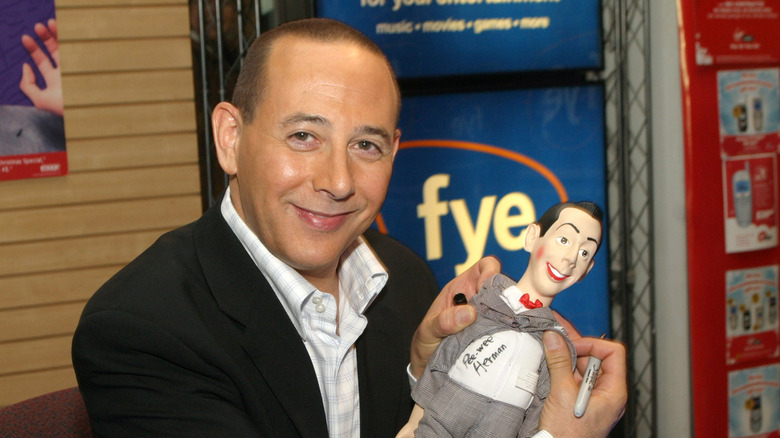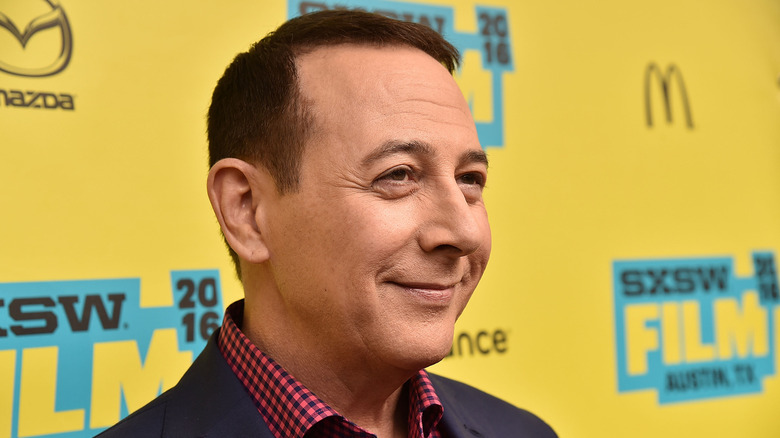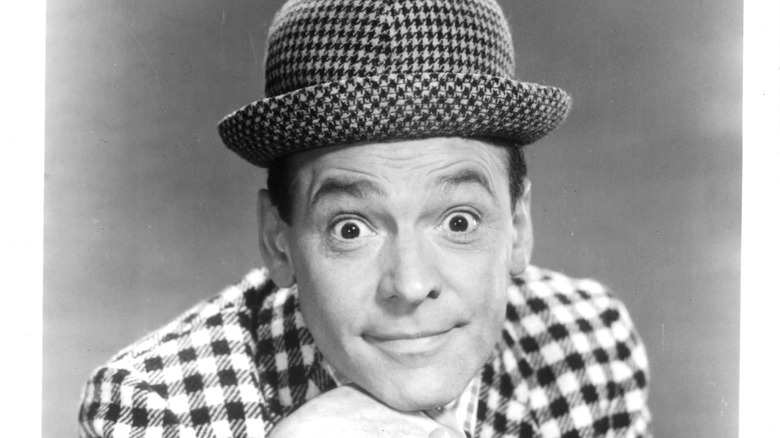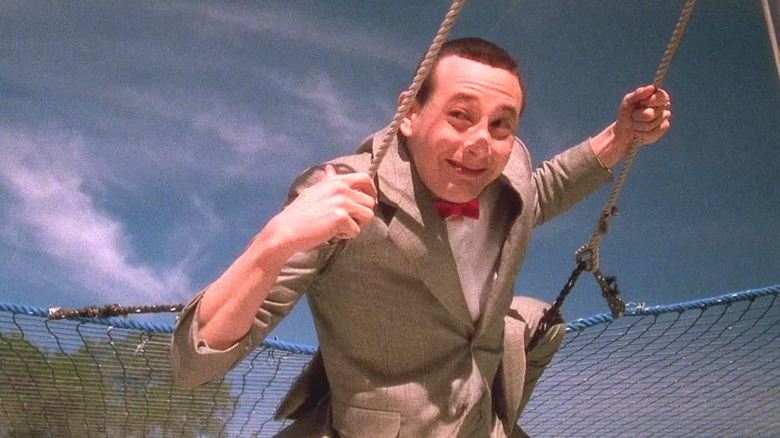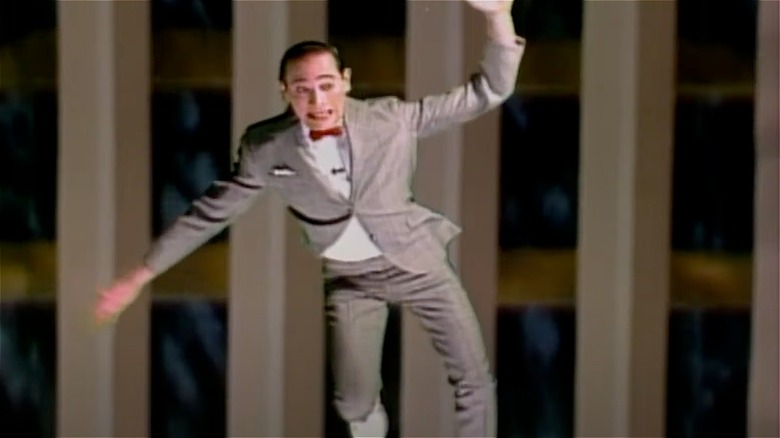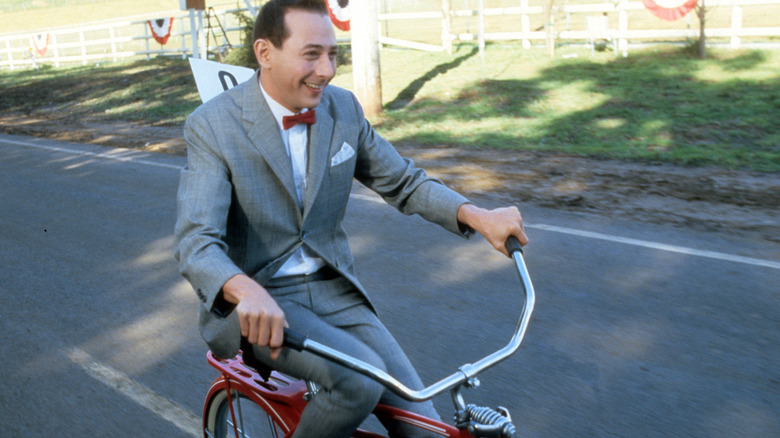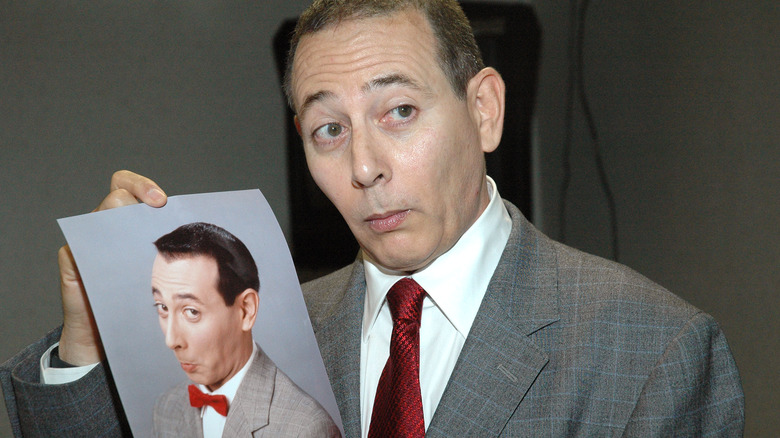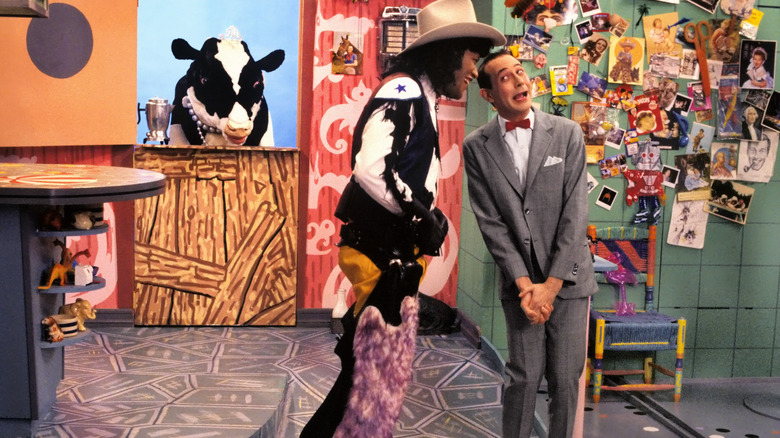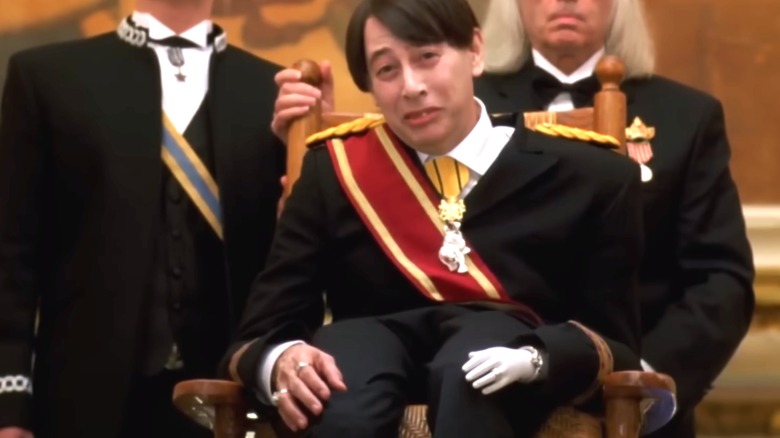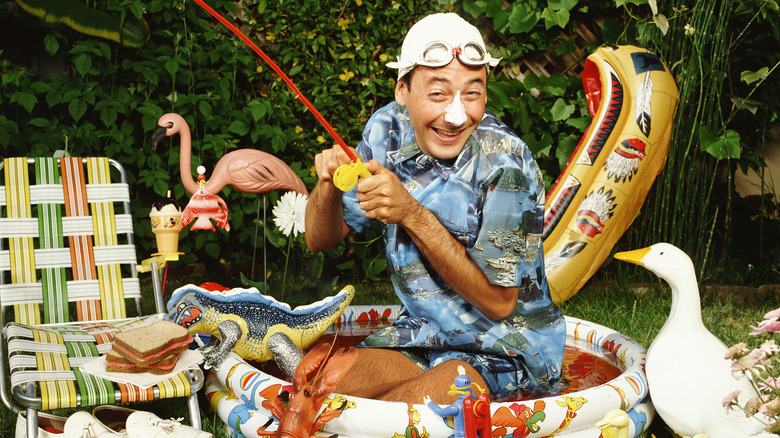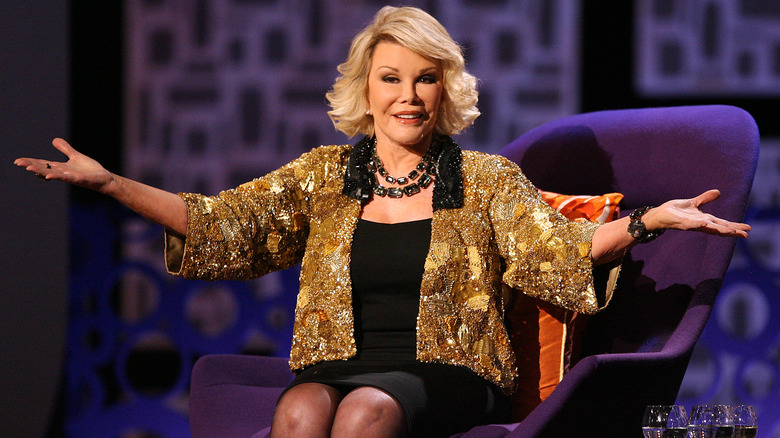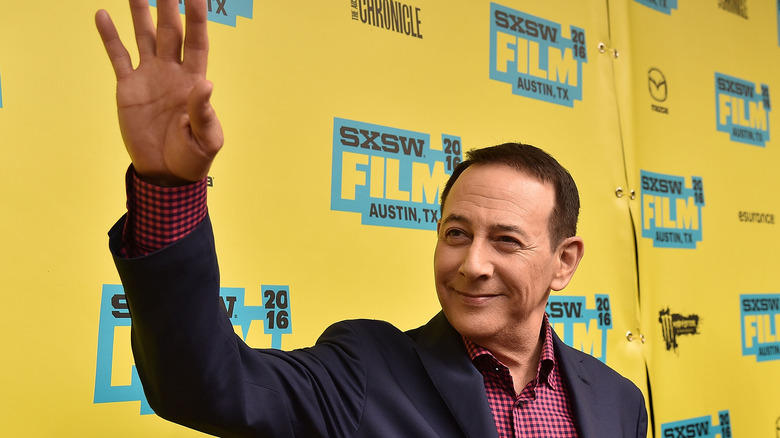The Untold Truth Of Paul Reubens
It's no wonder that 1980s kids loved Pee-wee Herman. Pee-wee lived in a carnival-colored alternate reality where growing up is optional and fun is always on the menu — a world where a Rube-Goldberg alarm clock that makes you breakfast is an achievable reality and bicycles are basically magic. His irreverent and surreal sense of humor defined absurdist comedy for a generation of young viewers. When the man responsible for bringing that bright, technicolor vision to life died of cancer after a long private battle, fans who grew up tuning into "Pee-wee's Playhouse" mourned the loss.
A complicated and private man despite his occasional legal trouble, Paul Reubens managed to weather a couple of serious scandals with a surprising amount of dignity and grace to revive his beloved character for a new generation to meet. If Pee-wee's death has you missing the days of "Meka Leka Hi, Meka Hiney Ho," you're not alone. Straighten your bowtie as we take a closer look at the untold truth of Paul Reubens.
He was once a contestant on The Gong Show
It's fairly common for aspiring show biz types to get their name and face out into the world with the occasional game show appearance, which is why many now-famous performers' TV credits include a handful of them. Take "Breaking Bad" actor Aaron Paul's adorable appearance on "The Price is Right," for example — a show Linda Cardellini of "Dead To Me" also showed up on at one point.
Another game show that was notorious for its celeb appearances was "The Gong Show," which originally ran on and off from 1976 to 1989. A precursor to shows like "America's Got Talent," "The Gong Show" gave contestants a chance to show off their skills to a panel of celebrity judges. Reserved for the worst of the worst performances was the show's signature gong. During its long and successful run on NBC, "The Gong Show" featured a handful of contestants who went on to become famous, including R&B singer Cheryl Lynn, Michael Winslow of "Police Academy" fame, actor Mare Winningham (singing a Beatles song), and New Wave band Oingo Boingo. Paul Reubens also used the show as an early showcase for Pee-wee Herman beginning in 1977.
According to Variety, Reubens appeared as Pee-wee and in various other disguises to skirt FCC rules, also appearing on "The Dating Show" around the same time. He was paid $500 for winning and received residuals for his appearance on "The Gong Show," which gave him a little career wiggle room so he could focus on his craft.
He was inspired by 1950s kids' show pioneer Pinky Lee
With his whimsically-charged, absurdist New Wave style, Pee-wee Herman was one of the most iconic children's show figures of the 1980s, leaving an indelible mark on kids of the latch-key era. It's a style critics have long suspected was influenced by 1950s kids' show star Pinky Lee, a link that was confirmed by Reubens' good friend Mark Mothersbaugh of Devo fame. Speaking to Yahoo, Mothersbaugh reflected on how both he and Reubens watched "The Pinky Lee Show" as kids, recalling, "Paul wore something similar to what Pinky wore. I mean, there were three channels on TV in those days; there wasn't much choice. You had Captain Kangaroo, and then later in the day, you had Pinky Lee."
A former vaudeville and burlesque performer, Pinky Lee was known for his wacky plaid suit and exaggerated performance style, which many observers believe influenced Pee-wee's sartorial style, mannerisms, and overall approach to comedy. Like Pee-Wee, who is known for his catchphrase "I'm rubber, you're glue," Pinky Lee had one of his own, often repeating, "Oooooh! You make me so mad!" during his performances. As reported by Vanity Fair in 1999, Reubens was also heavily influenced by a number of other TV shows of the era including "I Love Lucy," "Howdy Doody," "Captain Kangaroo," and "The Mickey Mouse Club."
He was crazy about the circus as a child
One of Reubens's most profound influences was his childhood love of the circus. At the formative age of nine years old, Reubens moved with his family to Sarasota, Florida, which also happened to be the winter home of Ringling Bros. circus. Not only was he living in a community heavily influenced by circus life, but he was neighbors with a handful of circus folk including cannon artists, high-wire artists, and a family of little people who performed as the Doll Family. Reubens and his sister first made the latters' acquaintance on Halloween one year, having knocked on their door, and found them to be particularly friendly, happily inviting the siblings inside their home. The experience proved perspective-shifting, with Reubens later telling Vanity Fair, "It was like being on acid when you were a kid. Everything was tiny, all the cabinets were down to here. The whole house was small."
Reubens later told Conan O'Brien that growing up, he became familiar with many aspects of the circus biz and even expected to join the circus one day. "I could do a lot of circus acts — I could do trapeze, I could do tightrope," Reubens added — skills he learned at circus camp as a child. Recalling a performance he did for his parents about six weeks into camp, Reubens said he came out on a balance beam in a Speedo holding a ring of fire, which he skipped through while blindfolded.
He was rejected by SNL
Reubens started to make a name for himself while working with The Groundlings. As word of him started to make its way out into the wider world, the logical next step for any budding comedian was to audition for "Saturday Night Live." As Reubens told Entertainment Weekly, he tried out for the show in 1980, the first of a five-year period when Lorne Michaels wasn't involved in the production. According to Reubens, he was beginning to pick up a reputation as a rising star around that time, and "It really seemed like I was going to be on SNL"
But when he walked into the audition room and saw Gilbert Gottfried there, he realized it wasn't going to happen because, as he put it, "We're both the same type of performer." While it wasn't meant to be, Reubens' beloved Pee-wee would end up having his SNL debut a few years later during the peak of his "Pee-wee's Big Adventure" fame. The Season 11 cold open featured Pee-wee walking a tightrope between the twin towers of the World Trade Center before falling after he is attacked by a bird. Pee-wee also appeared in one of Andy Samberg's SNL digital shorts in 2011, which was recently reposted by SNL in a posthumous tribute to the actor.
Pee-wee was the best thing to come out of Reubens' time with the Groundlings
Some of our best television and film performers got their start in improv — Eugene Levy, Lily Tomlin, David Cross, Bob Odenkirk, and Jim Carrey, just to name a few. Reubens began performing with the Los Angeles improv comedy troupe the Groundlings in the group's early days. Today, the Groundlings' more famous alumni list includes the likes of Will Ferrell, Jon Lovitz, Elvira, and Phil Hartman, among many others.
It was while appearing with the Groundlings that Reubens began to conceptualize the character of Pee-wee Herman. Calling the character's development "organic" in a Time interview, Reubens explained the origins of Pee-wee's iconic suit, which came from the founder and then-director of the Groundlings. According to Reubens, his director realized he needed a suit and was more than happy to pass on the slim gray suit Pee-Wee would become known for. "It was too small, which made it perfect," he emphasized. Not long after, he was given a tiny bowtie. The voice arrived in a burst of inspiration, and pretty soon the character we know and love had been born.
Pee Wee was named after a harmonica
Everything about Paul Reubens' alter-ego seemed to go back to his childhood, even the name he chose for his character. For his character's surname, he wanted to use something real, which led him to adopt the name of a kid he knew growing up in Florida. As Reubens told Vanity Fair, "I like that it didn't sound like a made-up name, that it was just kind of cruddy." He took his first name from a type of harmonica Reubens had while growing up — but it wasn't just any harmonica.
Like so many things that influenced Reubens, the Pee Wee harmonica was a slice of post-war life in the pop culture-fueled atomic age. According to the National Museum of American History, Pee Wee harmonicas were produced in Japan during the post-war occupation. But what made them unique was how tiny they were. As Retro Thing, a site dedicated to vintage toys and novelties, explained, Pee Wees were keychain-sized harmonicas when they were at the peak of their popularity during Reubens' childhood.
Reubens was conscious about Pee Wee's influence on children's health
Paul Reubens took his role as a children's show star very seriously, something that extended to the level of responsibility he felt for how children perceived his image and messaging. The merchandising opportunities for "Pee-wee's Playhouse" were wide open. But Reubens wasn't about to let Pee-wee's name be stamped on just anything, and he insisted on only producing quality Pee-wee products.
In the Saturday morning cartoon heyday of the 1980s, many brands could be found slapped across everything from sugary breakfast cereals to candy lines, but Reuben wouldn't sign off on any junk food promotions. He also patently refused to promote candy bars with Pee-wee's image. But there was one cereal Reubens almost did sign his name to, after Ralston Purina came up with a healthier breakfast cereal sweetened with fruit juice rather than sugar and enriched with vitamins. Reubens told Vanity Fair the cereal "tasted just like Trix," his own favorite cereal while growing up. The commercial was meant to be downright absurd, featuring a 1960s mom feeding her children cereal like dogs. Sadly, as Reubens later told NPR, kids apparently didn't enjoy the taste of the cereal, so the plan never came to fruition.
He tried to keep his real name out of the limelight
When Reubens first dreamed up Pee-wee, he worked hard to present the child-like figure as real, which his in-character appearances on shows like "The Dating Game" served to reinforce. Speaking to NBC, Reubens recalled, "I thought Pee-Wee Herman worked better if one didn't know that I was an actor. So I went out of my way to try and get the public to think that that was a real person." Reubens tried to keep the ruse going for years, intentionally keeping his personal persona out of the limelight until his extenuating legal circumstances made it impossible to do so.
Still, it's worth noting that Pee-wee wasn't the only character Reubens inhabited through the years. Although none were as famous as Pee-wee, many were plenty memorable — like the voice of AI drone ship commander Max in Disney's "Flight of the Navigator" or his role as the inbred Austrian prince he played on "30 Rock" — a role created by Tina Fey especially for Reubens to play.
There were a couple of Pee Wee films that never got made
During Pee-wee's original rise to fame, the beloved character appeared in both his own TV show as well as in two feature films. In 2007, SFGate reported that Reubens had been shopping around a few different Pee-wee Herman treatments for upwards of five years. The first and oldest of his ideas was meant to offer a dark take on the Pee-weeverse. In the film, a dark comedy, Pee-wee finds fame, but it causes him to spiral, transforming into a "Valley of the Dolls" monster.
The other couldn't be more different in terms of tone and style. Meant to be a lighthearted children's story, this treatment would have focused on Pee-wee and his Playhouse friends adventuring across the Puppetland lying beyond its doors. While rumors that it had been greenlit circulated for a while, nothing ever came to fruition. But as it turns out, Reubens went with Door Number 3, when the world got its Pee-wee Herman comeback in 2016 with the Netflix-distributed "Pee Wee's Big Holiday." Sadly, Reubens' death left a few stories untold for his beloved character. Other ideas for the Pee-weeverse that never saw the light of day were a reality-based road story and a "Pee-wee Herman Show" revival.
Joan Rivers was his good friend and mentor
Despite all of the challenges his reputation faced through the years, Paul Reubens always seemed to have a lot of celebs backing him. After his death, messages poured from famous faces who considered him a dear friend. In an Instagram post, Ricki Lake called him a "loyal and absolutely hilarious friend," while Jimmy Kimmel tweeted, "He never forgot a birthday [...] My family and I will miss him." But one of Reubens' most famous friendships was his relationship with the late comedian and talk show host Joan Rivers.
Introducing Reubens for "The Late Show Starring Joan Rivers" in 1987, Rivers referred to him as a "dear, dear, dear friend" and "one of the few people I would trust with my own show." For his part, Reubens always thought of her as a mentor. In the Hollywood Reporter tribute sharing personal experiences of Rivers in celebration of her 80th birthday, Reubens recalled her advice before he hosted her show: "My secret as a host of this show is that I really listen to these people. It's their time, they're the guests, you're the host." Despite her abrasive personality, Reubens went on to call Rivers a "wonderful, great, loyal friend," emphasizing that he could never join the crowds mocking her for that reason.
His scandals weren't cut and dried
One of the unfortunate side effects of Paul Reubens' commitment to fully embodying Pee-wee was that when Reubens was caught up in a rather adult scandal, it was hard for the public to separate the actor from the character he played. And nobody wants to think about a children's character caught up in an adult scandal. When Reubens was arrested in 1991 inside of an adult theater on charges of indecent exposure, there was a sense of innocence betrayed, In an instant, he had become fodder for off-colored jokes and if nothing else, cast "Pee-wee's Playhouse" in a troubling light. But even back when the initial scandal broke out, Reubens had his supporters, either in light of his own claims that the charges were spurious or because many Americans saw it as a victimless crime.
His reputation took another hit in 2002 when LAPD claimed Reubens had been in possession of pornography containing minors — charges that were quickly downgraded to a misdemeanor obscenity charge. As the Village Voice would later report, the whole debacle arose amid L.A. prosecutor Rocky Delgadillo's moral crusade against alleged celeb sex crimes. Going off a tip, police raided Reubens' home, where they found a vast collection of vintage erotica they felt may have contained a minor in there somewhere. After a year of combing through the evidence yielded no conclusive proof, they ended up essentially dropping the whole thing.
